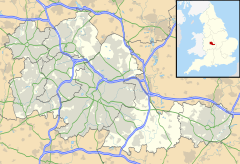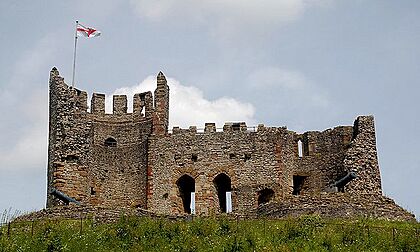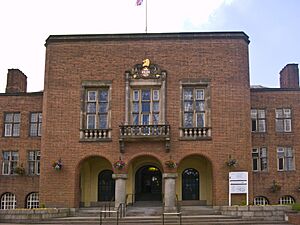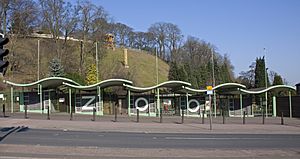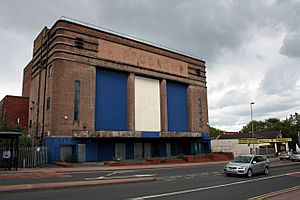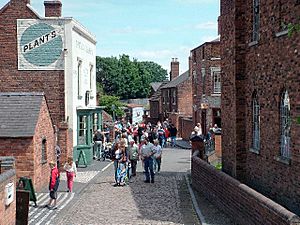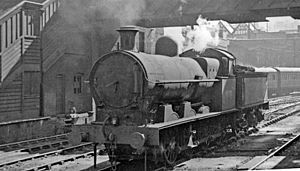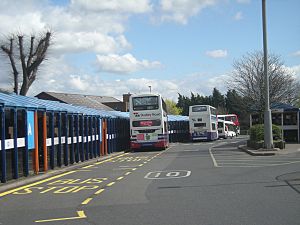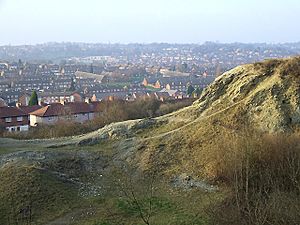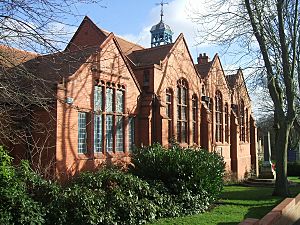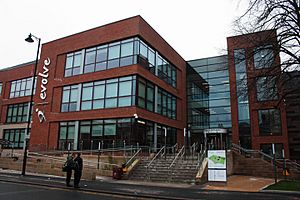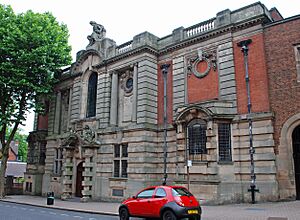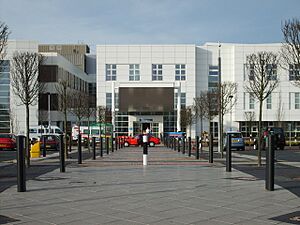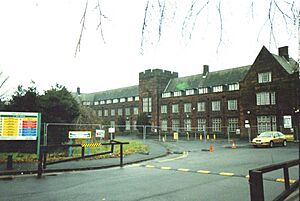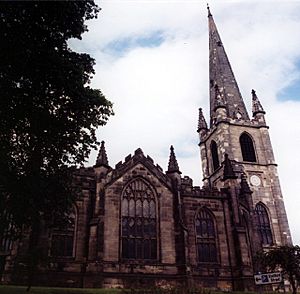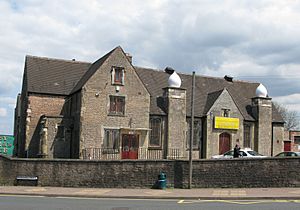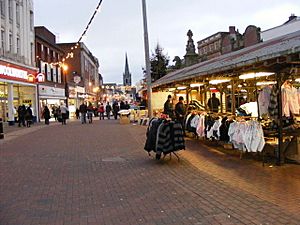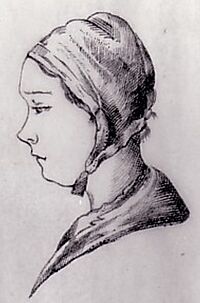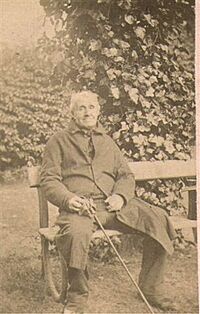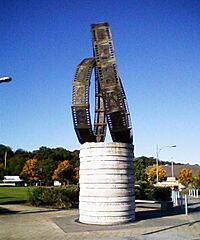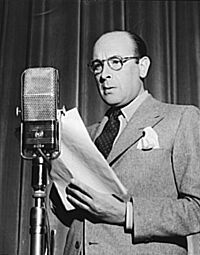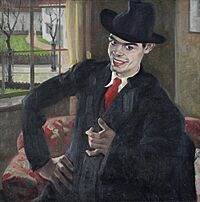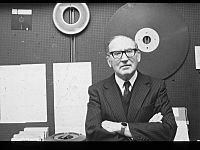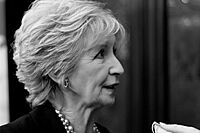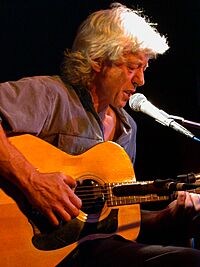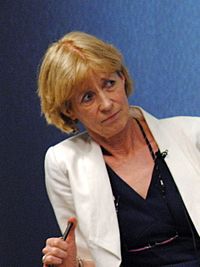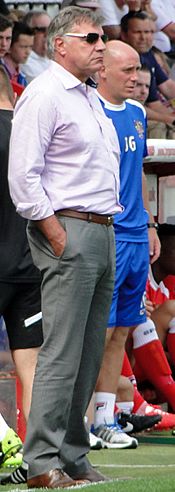Dudley facts for kids
Quick facts for kids Dudley |
|
|---|---|
| Town | |
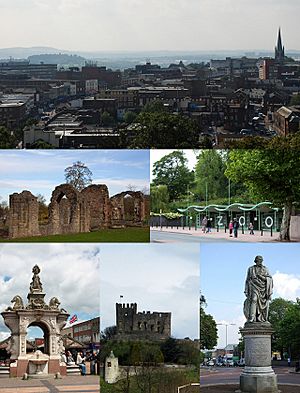 From top left: Dudley Town Centre viewed from Castle Hill with the spire of St Thomas church; Dudley Priory; Dudley Zoo; Dudley Market Place; Dudley Castle; Statue of William Ward, 1st Earl of Dudley. |
|
| Population | 79,379 (Built-Up Area) 312,900 (Metropolitan Borough) |
| OS grid reference | SO9490 |
| • London | 108 mi (174 km) |
| Metropolitan borough |
|
| Metropolitan county | |
| Region | |
| Country | England |
| Sovereign state | United Kingdom |
| Post town | DUDLEY |
| Postcode district | DY1 – 3 |
| Dialling code | 01384 0121 01902 |
| Police | West Midlands |
| Fire | West Midlands |
| Ambulance | West Midlands |
| EU Parliament | West Midlands |
| UK Parliament |
|
Dudley is a historic market town in the West Midlands, England. It is about 6 miles (10 km) southeast of Wolverhampton and 8 miles (13 km) northwest of Birmingham. Dudley was once part of Worcestershire. Today, it is the main town of the Metropolitan Borough of Dudley. In 2011, Dudley had a population of 79,379 people. The larger Metropolitan Borough had a population of 312,900.
Dudley is often called the "capital of the Black Country". This area got its name because of its many coal mines and ironworks. Dudley was a key place during the Industrial Revolution. It grew with industries like iron, coal, and limestone. Later, these industries declined. In the 1980s, many shops moved to the Merry Hill Shopping Centre. Today, popular places to visit include Dudley Zoo and Dudley Castle, the old priory ruins, and the Black Country Living Museum.
Contents
- Dudley's Past: A Look at History
- How Dudley is Governed
- Famous Places and Attractions
- Dudley's Culture and Entertainment
- Getting Around Dudley: Transport
- Dudley's Landscape and Nature
- Dudley's Population: Demographics
- Learning in Dudley: Education
- Public Services in Dudley
- Faith and Religion in Dudley
- Dudley in the News: Media
- Dudley's Economy: Shops and Industry
- Famous People from Dudley
- Sports in Dudley
- Dudley's Twin Town
- See also
Dudley's Past: A Look at History
Early Beginnings of Dudley

Dudley's history goes back to the time of the Anglo-Saxons. Its name, Duddan Leah, means "Dudda's clearing." One of its churches is named after the Anglo-Saxon king, Edmund.
Dudley was mentioned in the Domesday Book of 1086 as Dudelei. It was a medium-sized manor owned by Earl Edwin of Mercia before the Normans arrived. William Fitz-Ansculf became the Lord of the Manor in 1086. Dudley Castle was built in 1070 by William's father, Ansculf de Picquigny. It became the main seat of the large Barony of Dudley, which owned land in many counties.
In 1138, King Stephen attacked Dudley. This happened after a failed siege of the castle. The baron had supported Empress Matilda during a time of civil war called The Anarchy.
The castle helped the town grow. Early coal and iron mining made Dudley an important market town in the Middle Ages. It sold farm goods and iron products across the country. Iron working and coal mining started as early as the 13th century. Dudley became a borough in the mid-13th century. This was when Roger de Somery, the Baron of Dudley, allowed a market in nearby Wolverhampton.
Industrial Growth and Modern Changes
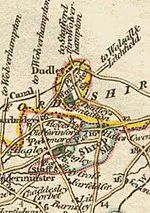
By the early 1500s, the Dudley estate was in debt. It was sold to John Dudley, 1st Duke of Northumberland. After he was executed in 1553, the estate returned to the Sutton family. Queen Elizabeth I visited the town during their ownership.
In 1605, some people involved in the Gunpowder Plot fled to Holbeche House nearby. They were caught there by the Sheriff of Worcestershire's forces.
During the English Civil War, Dudley was a stronghold for the King's supporters (Royalists). The castle was attacked twice by the Parliamentarians. It was partly destroyed after the Royalists gave up.
Dudley was quite poor in the 16th and 17th centuries. But the Industrial Revolution changed things. In the early 17th century, Dud Dudley found a way to melt Iron ore using coke. This was done at his father's works. Later, Abraham Darby I, who was related to Dud Dudley, was the first to make iron commercially using coke in 1709.
Dud Dudley's discovery, along with better roads and the Dudley Canal, made Dudley an important industrial hub. The first Newcomen steam engine was installed near Dudley Castle in 1712. It was used to pump water from mines.
Dudley's population grew a lot in the 18th and 19th centuries. This was due to the rise of industries like coal and limestone mining. Other industries included iron, steel, engineering, and glass cutting.
Living conditions were very poor during this time. In 1851, Dudley was called "the most unhealthy place in the country." This led to new clean water and sewage systems. Later, in the 20th century, many council houses were built. This helped people move out of crowded slum areas.
In 1865, Dudley became a Municipal Borough. It became a County Borough in 1889.
Dudley in Recent Times
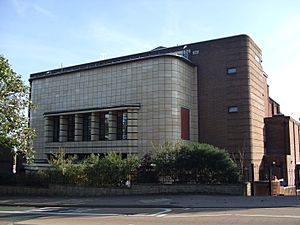
Dudley grew a lot in the early 1900s. Many entertainment places like theatres and cinemas were built. Two indoor shopping centres were added later. In 1937, the grounds of Dudley Castle became Dudley Zoo. The zoo buildings were designed by architect Berthold Lubetkin. On its first day, about 250,000 people tried to visit!
During World War II, Dudley was bombed several times. On November 19, 1940, a bomb hit a pub in the town centre. It damaged nearby buildings, but no one died. However, on the same night, a large bomb hit the Oakham area. It destroyed council houses and killed 10 people. On August 12, 1941, four more people died from another bomb. These were the only deadly air raids on Dudley.
After the war, Dudley's industries grew. Many people from the British Commonwealth, like the Caribbean and South Asia, moved to the town. This included the parents of famous comedian Lenny Henry. These communities faced challenges like racism and poor housing. There were large riots in 1962.
In 1966, local government changed. Dudley expanded to include parts of nearby areas like Brierley Hill and Sedgley. In 1974, the current metropolitan borough was created. It included Stourbridge and Halesowen.
On November 23, 1981, a small tornado hit Dudley. It passed through the town centre and caused some damage.
Dudley's industries declined, leading to job losses. The Merry Hill Shopping Centre opened between 1985 and 1990. Many big shops moved there from the town centre. This made the town centre less busy. The 2008 financial crisis also caused more shops to close.
How Dudley is Governed
Local Government in Dudley
| Dudley Improvement Act 1791 | |
|---|---|
| Act of Parliament | |
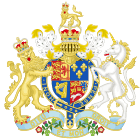
|
|
| Long title | An Act for better paving, cleansing, lighting, watching, and otherwise improving the Town of Dudley, in the County of Worcester, and for better supplying the said Town with Water. |
| Citation | 31 Geo. 3. c. 79 |
| Dates | |
| Royal assent | 6 June 1791 |
Dudley has been a borough since the late 1200s. From the 1500s until 1791, it was run by the Lords of Dudley. After 1791, Town Commissioners took over. In 1865, Dudley became a municipal borough. It became a county borough in 1888.
For many years, Dudley was part of Worcestershire. This was even though the castle was in Staffordshire. Today, the town and borough are still part of the Anglican Diocese of Worcester.
Dudley Council House on Priory Road is where the local council meets. It was opened in 1935 by the Duke of Kent. Dudley Town Hall, used for events, opened in 1928.
Dudley is the main centre for the Metropolitan Borough of Dudley. This borough also includes Halesowen and Stourbridge. In 2011, the borough had a population of 312,925. In 2012, Dudley tried to become a city but was not chosen.
National Government Representation
Dudley has two areas that elect Members of Parliament (MPs): Dudley North and Dudley South. These cover the town and its surrounding areas. As of the 2019 general election, the MPs for these areas are Marco Longhi and Mike Wood. Both are from the Conservative Party.
Famous Places and Attractions
The 13th-century ruins of Dudley Castle stand over the town. It is a very important historic building. Dudley Zoo is built within the castle grounds. It is home to many endangered animals. It also has the world's largest collection of Tecton buildings, which are unique and modern designs. There are plans to improve the zoo, including a tropical dome and Asiatic forest.
Dudley has many canals. The main one is the Dudley Canal. Much of it goes under the town through the Dudley Tunnel. You can only travel through the tunnel by boat. The open parts of the canal are popular for walking, cycling, and fishing. Many canal paths have been improved for cycling and are part of the National Cycle Network.
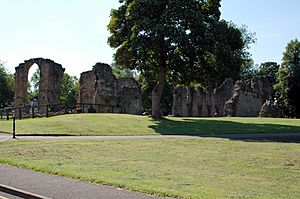
St James's Church at Eve Hill had a school that closed in the 1970s. It was later moved to the Black Country Museum in 1989.
Dudley and its area have 11 scheduled ancient monuments. These are important historical sites. There are also 260 listed buildings, including 6 very important Grade I listed buildings.
Dudley's Culture and Entertainment
Fun and Entertainment Spots
Dudley used to have many cinemas and theatres. The Dudley Hippodrome was one of the biggest theatres in the West Midlands. It was built in 1938. After closing in 1964, it became a bingo hall until 2009. Despite efforts to save it, the building was demolished in 2023.
The Plaza Cinema closed in 1990. The Odeon Cinema became a Jehovah's Witness Kingdom Hall in 1976. Today, there is an Odeon Cinema at the Merry Hill Shopping Centre.
Dudley now has a Showcase Cinema and a Tenpin bowling alley. These are located at the Castle Gate complex. The Town Hall also hosts dances, plays, and concerts.
Until 2011, the JB's nightclub was on Castle Hill. It was known for live music and hosted early shows by bands like U2 and Dire Straits. It closed and is now a banqueting centre.
Museums and Art Galleries
Dudley's museums celebrate the town's history and its role in the Industrial Revolution. The Black Country Living Museum is an open-air museum. It has reconstructed buildings from the area, showing what an industrial village was like. People demonstrate life from that time. In 2022, work began to recreate a typical Black Country town centre with original buildings.
The Dudley Museum and Art Gallery closed in 2016 due to budget cuts. Some of its collections were moved to the local archives centre on Tipton Road.
Getting Around Dudley: Transport
Train Travel in Dudley
Dudley has two railway stations, Dudley Port and Tipton. They are just over a mile from Dudley town centre. These stations are on the same line and are served by West Midlands Trains. The nearest station within the Dudley borough is Coseley. For longer journeys, the Sandwell & Dudley station in Oldbury is nearby.
The old Dudley railway station in the town centre closed in 1964. It was once a busy hub for trains going to Birmingham, Wolverhampton, and Stourbridge. The site was later used for freight.
Plans to reopen the railway line between Dudley and Dudley Port were discussed. This would allow a light rail link to the town centre. However, this plan was changed. Instead, the line will be used for the West Midlands Metro tram extension to Brierley Hill and Stourbridge.
Bus Services in Dudley
Dudley bus station is in the town centre. It connects to many nearby towns and cities like Birmingham, Halesowen, and Wolverhampton. National Express also runs coach services from here, mainly to London. There are smaller bus stations at Russells Hall Hospital and the Merry Hill Shopping Centre.
Dudley's town centre has had a bus station since 1952. The current bus station opened in 1987. Work on a new replacement bus station started in January 2024. Buses are using temporary stops nearby during construction.
Road Network in Dudley
Dudley is connected by main roads to nearby towns. The B4176 goes to Wombourne and Bridgnorth. The A461 passes through Wednesbury and Walsall.
The closest motorway is the M5, about 3 miles (5 km) southeast of the town.
Airports Near Dudley
The nearest international airport is Birmingham Airport, about 19 miles (31 km) to the east. The closest local airport is Wolverhampton Airport, about 10 miles (16 km) to the west.
Tram Services in Dudley
Dudley used to have two tram routes in the late 1800s. One linked the town with Tipton and Wednesbury. It opened in 1884 and closed in 1930. The other linked Dudley with Birmingham. It opened a year later and closed in 1939. Both were replaced by buses.
In 2021, construction began on a new tram line. This West Midlands Metro line will run from Wednesbury to Brierley Hill through Dudley. It will connect Dudley to Birmingham City Centre and Wolverhampton. The first part is expected to open in 2025.
Dudley's Landscape and Nature
Geology and Natural Features
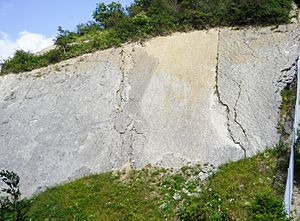
Dudley is located in the South Staffordshire Coalfield. This area's coal helped the town grow during the Industrial Revolution.
Northwest of the town centre is the Wren's Nest Nature Reserve. It was the first British nature reserve in a town. It is a very important geological site. It was mined for centuries because of its large limestone deposits. It is also one of England's largest fossil sites. The town gave its name to the "Dudley locust," a type of trilobite fossil found there in 1749.
In the 1830s, geologist Sir Roderick Murchison visited Wren's Nest to collect fossils. A large part of his research on "The Silurian System" came from Dudley.
Areas Within Dudley
Dudley's Population: Demographics
| Dudley Compared | ||||
|---|---|---|---|---|
| 2011 UK Census | Dudley (Built-up area subdivision) |
Dudley (Borough) | West Midlands region | England |
| Total population | 79,379 | 312,925 | 5,601,847 | 53,012,456 |
| White British | 78.4% | 88.5% | 79.2% | 79.8% |
| Asian | 12.3% | 6.0% | 10.8% | 7.7% |
| Black | 3.6% | 1.4% | 3.2% | 3.4% |
| Mixed | 3.2% | 1.8% | 2.8% | 2.2% |
| Other | 2.5% | 2.1% | 4.5% | 6.7% |
| Source: Office for National Statistics | ||||
The population of Dudley is 79,379. This number is different from the 2001 census (194,919). This change happened because the town's boundaries were redefined. For example, Kingswinford, which was once included, is now considered a separate town.
Learning in Dudley: Education
Primary Schools in Dudley
Dudley has many primary schools for children aged 5 to 11. Some of these are church schools, like Jesson's Church of England Primary School. Other primary schools include Priory Primary School, Kates Hill Primary School, and Russells Hall Primary School. Many schools are named after the areas they are in. Some schools also have nurseries for younger children aged 3 and 4.
Secondary Schools in Dudley
There are several secondary schools in and around Dudley. The Dudley Academies Trust runs four of them: Beacon Hill Academy, The Link Academy, Pegasus Academy, and St James Academy.
Bishop Milner Catholic College is a Roman Catholic secondary school. It opened in 1960 and is the oldest existing secondary school by name in Dudley.
All of Dudley's grammar schools became comprehensives in 1975. This meant they accepted students of all abilities. Some schools merged, like Dudley's boys and girls grammar schools, which became The Dudley School.
Special Schools in Dudley
Dudley has several special schools for students with special educational needs. The Old Park School serves pupils from age 3 to 19. The Rosewood School also helps children in this age range. The Woodsetton School near Sedgley is for pupils aged 4–11. Sutton School in Russells Hall is for pupils aged 11 to 16.
Further and Higher Education
Dudley College of Technology provides further education. It was first set up as a Mechanics' Institute in 1862. New campuses were built in the town centre in 2012.
Dudley also had a college for teachers, which later became part of the University of Wolverhampton. This campus closed in 2002. A new Institute of Technology, offering higher education courses, opened in the Castle Hill area in 2021.
Public Services in Dudley
Libraries for Learning
Dudley Library is on St. James's Road in the town centre. The current building opened in 1909. It is a Grade II listed building. The town has had a public library since 1878. The library was expanded in 1966 and refurbished in 2002 and 2012.
The library service also runs eight smaller branch libraries and four self-service 'Library Links'. There are also four other main libraries in the Dudley Borough.
Medical Care in Dudley
Dudley has several National Health Service facilities. The main hospital is Russells Hall, located south of the town. It opened in 1983. A major expansion in 2005 brought all inpatient services from other hospitals to Russells Hall.
The Guest Hospital started as a charity hospital in 1849 for blinded miners. It became a general hospital in 1871. It is now an outpatient-only centre.
Bushey Fields Hospital provides mental health care. It was built next to Russells Hall Hospital in the 1980s and 1990s. It replaced facilities at Burton Road Hospital, which closed in 1993.
Dudley's ambulance station opened in 1986.
Emergency Services in Dudley
West Midlands Police handles law enforcement in Dudley. The main police station for the borough is in Brierley Hill. The Dudley Police Station closed in 2017, but some officers still work in the town centre.
West Midlands Fire Service provides fire and rescue services. The fire station is on Burton Road. West Midlands Ambulance Service provides emergency medical care. The ambulance station is also on Burton Road.
Dudley also has local groups for the Army Cadet Force, Air Cadets, and Sea Cadets.
Faith and Religion in Dudley
Dudley is part of the Anglican Diocese of Worcester. It has its own Archdeaconry and suffragan bishop. The town has many churches, including the Church of St. Edmund, Church of St. James, and Church of St. Thomas. In the Kate's Hill area, St John's churchyard is where William Perry, a famous 19th-century boxer, is buried.
St. Edmund's is the oldest church, dating back to Anglo-Saxon times. The current building was built in 1724. St. Thomas' church dates from the 12th century and was rebuilt in 1815. Both are important listed buildings.
Dudley Priory was a monastery founded around 1160. It was used until the Dissolution of the Monasteries. Today, its ruins are part of Priory Park.
For Roman Catholics, there is a church called Our Blessed Lady and St Thomas of Canterbury. It was designed by architect Augustus Pugin and built in 1842.
Dudley also has two Methodist Churches, a Baptist Church, and a Salvation Army Church.
Other religious groups have places of worship too. There is a Jehovah's Witness Kingdom Hall, two Sikh gurdwaras, and a Hindu temple. The old St Edmund's Church School is now a mosque for the town's Islamic community. Another mosque is in the Queen's Cross area.
Dudley in the News: Media
Dudley has several local newspapers. The Express & Star is published daily. The Dudley News is published weekly. The Black Country Bugle focuses on the history of Dudley and the Black Country. Local TV news is provided by Midlands Today and Central Tonight.
Local radio stations include BBC Radio WM, Free Radio, and Heart West Midlands. Black Country Community Radio broadcasts online from Dudley. The Kates Hill Press, founded in 1992, publishes local fiction and non-fiction.
Dudley's Economy: Shops and Industry
Shopping in Dudley
Dudley town centre has faced challenges. In 2012, almost a third of its shops were empty. This was the highest rate for a town of its size in England. The opening of the Merry Hill Shopping Centre between 1985 and 1990 greatly affected Dudley. Many big shops moved to Merry Hill. This caused a 70% drop in Dudley's retail business between 1985 and 1990.
More recently, economic problems have led to more major shops leaving. The department store Beatties closed in 2010. WH Smith closed in 2013, River Island in 2020, and Argos in 2021. The town centre now has many take-away restaurants, charity shops, and gambling centres. In 2014, a study called Dudley "the worst place to shop in the UK."
The town's market is still a popular shopping spot. It started in the 12th century and is on a wide part of the High Street. It has been updated many times, including a large redevelopment in 2015.
Dudley's Industries
The Bean Cars factory opened in the early 1900s and was used until the 1930s. The building is still used for other industrial purposes today.
Famous People from Dudley
Historical Figures (Before 1900)
- John Sutton, 1st Baron Dudley (1400–1487) – A nobleman and diplomat for King Henry VI.
- Abraham Darby I (1678–1717) – A pioneer in industry who developed a way to make iron using coke.
- Catherine Payton Phillips (1727–1794) – A Quaker Minister who traveled widely.
- John Badley (1783–1870) – A surgeon and medical pioneer from Dudley.
- James Whale (1889–1957) – A famous film director, known for movies like Frankenstein and Bride of Frankenstein.
- Sir Cedric Hardwicke (1893–1964) – A stage and film actor with a career spanning almost 50 years.
Modern Day Personalities (After 1900)
- Percy Shakespeare (1906–1943) – An artist known for his figure drawings and portraits.
- Sir Maurice Wilkes (1913–2010) – An important British computer scientist.
- Sue Lawley (born 1946) – A well-known English TV and radio broadcaster.
- Sir Lenny Henry (born 1958) – A famous stand-up comedian, actor, and TV presenter.
- Jason Bonham (born 1966) – A drummer, and son of Led Zeppelin drummer John Bonham.
- Tyler Bate (born 1997) – A British professional wrestler who works for WWE.
Sports Stars from Dudley
- Dorothy Round (1909–1982) – A tennis player who won Wimbledon women's singles twice.
- Duncan Edwards (1936–1958) – A famous England footballer who played for Manchester United. He died in the Munich air disaster. A statue of him is in the town centre.
- Sam Allardyce (born 1954) – A former English football player and manager, who also managed the England national team.
- Reanne Evans (born 1985) – An English professional snooker player who won the WLBSA Ladies World Snooker Championship ten times.
Sports in Dudley
Football (Soccer)
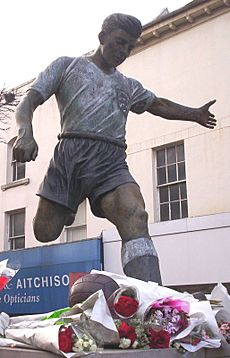
Dudley's main football teams are Dudley Town F.C. and Dudley Sports F.C.. Dudley Town is the older club and has had more success. In 1985, they were promoted to a higher league. However, they had to leave their home ground due to mining subsidence. They now play at Noose Lane in Willenhall.
Rugby Football
The Dudley Kingswinford Rugby Club is the local rugby team. They play at their grounds in Wall Heath.
Motor Sports
For a short time, a speedway team called Dudley Heathens tried to find a place to race in Dudley. The team now plays in Wolverhampton and Birmingham. They were originally called the Cradley Heath Heathens. Their old home track was near the Cradley Heath/Dudley border. The stadium was demolished in the 1990s. The team reformed as Dudley Heathens in 2010, but later changed their name back to Cradley Heathens in 2013.
Volleyball
The Wombourne V.C. volleyball team plays at the Evolve campus of Dudley College. They compete in the West Midlands Volleyball Association.
Dudley's Twin Town
Dudley is twinned with:
- Fort William, Scotland
See also
 In Spanish: Dudley para niños
In Spanish: Dudley para niños
 | John T. Biggers |
 | Thomas Blackshear |
 | Mark Bradford |
 | Beverly Buchanan |


